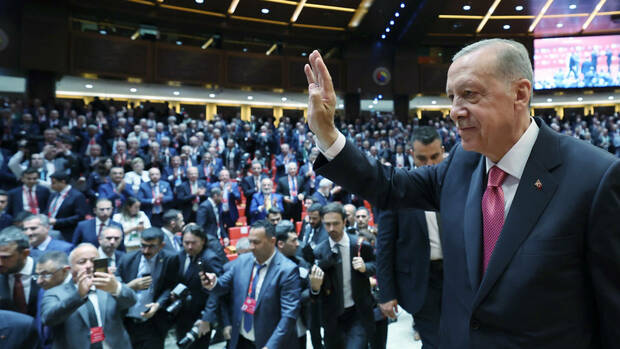The Turkish President on Tuesday visiting the 79th General Assembly of the Union of Chambers and Stock Exchanges of Turkey.
(Photo: IMAGO/APAimages)
Istanbul Turkey’s economy is growing at a slower pace, while the prices of key products continue to rise. Gross domestic product rose four percent year-on-year in the first quarter of the year, according to data from Turkey’s statistical agency.
Compared to the previous quarter, growth is therefore 0.3 percent. That’s slightly more than analysts were expecting, but significantly less than last year, when growth was 5.6 percent.
At the same time, the recently re-elected government of President Recep Tayyip Erdogan announced that it would raise prices for numerous important products. State-owned companies, for example, increased the price of tea by 40 percent, coffee by 21 percent and sugar by 20 percent. Milk and dairy products have gone up in price by a third on average overnight. The government did not justify the move.
The state energy regulator increased gasoline prices by 7 percent. Municipalities also charge more for their services. In Kocaeli near Istanbul, one of the country’s most important industrial zones, companies suddenly have to pay 80 percent more for the city’s water supply. The water bill for private households in the province will also increase by 40 percent.
On Sunday, Erdogan was re-elected president with 52.18 percent. For several years he had increased his influence over the country’s economic and monetary policies.
Inflation rose to 85.5 percent last fall and the trade deficit hit a record high. At the same time, Erdogan ordered the central bank’s key interest rate to be lowered. It is currently at 8.5 percent. Combined with the high inflation, it is unattractive for international investors to invest in Turkey.
In February, a series of earthquakes shook southeastern Turkey, killing more than 50,000 people. The destroyed area corresponds to a third of Germany’s area and generates around ten percent of the country’s exports.
Focus on budget consolidation
Exports fell accordingly in the first quarter, especially in agriculture and industry. The construction sector, on the other hand, showed the best development in five years with growth of 5.1 percent according to the statistics authority. According to analysts, this is mainly due to the reconstruction after the earthquake.
The country was the fastest-growing economy in the G20 last year, after Saudi Arabia and India, posting growth of more than five percent, according to the statistics agency. Erdogan’s government fueled this growth during the election campaign with cheap credit and heavily subsidized electricity bills, as well as increases in the minimum wage and pensions. In addition, Erdogan had used the central bank’s foreign exchange reserves to support the exchange rate of the national currency, the lira.
With victory secured, it is expected that Erdogan will stop handing out more “freebies” such as subsidies, cheap loans and hefty wage increases for civil servants and retirees, instead shifting the focus to fiscal and trade balance consolidation.
>> Read here: Erdogan remains president – which means his election victory
According to a Bloomberg survey of economists, the country’s growth will slow to 1.6 percent in the second quarter and 2.7 percent in 2023 as a whole. “We expect economic policy to tighten in the second half of the year, which will lead to a slowdown in growth,” Goldman Sachs economist Clemens Grafe said.
The Turkish lira has fallen to a record low since the weekend. A US dollar cost 20.71 lira as of Wednesday morning (local time), down 2 percent in one day and 3.6 percent since election Sunday. Since then, the stock market has risen by more than seven percent, mainly because export companies are benefiting from the weaker lira.
“Turkey’s economy continues to be under pressure on the lira and the country’s balance of payments after President Erdogan’s election victory,” says Thomas Gillet of rating agency Scope Ratings. The Turkey experts at the major Swiss bank UBS also assume that the lira will depreciate more in the coming months: “Holding the lira is a burden on the economy and appears to be increasingly unsustainable in view of the country’s exhausted foreign exchange reserves.”
More: An old acquaintance is supposed to save the Turkish economy



